WHEN THE RAIN DOESN'T COME
In Australia, Drought Angels organize to provide assistance and relief to small farmers. In Los Angeles, Chef Curtis Stone supports their efforts with his celebrated restaurant, Maude.
Editor’s Note: This story was originally published in The Extinction Issue of our quarterly newspaper, Life & Thyme Post. Get your copy.
For all of our modern advances, the way the majority of us eat remains a shockingly simple system: one part farmer, one larger part earth. The two go hand in hand, with one ever at the mercy of the other. In Australia, the lining of that relationship is beginning to fray.
It’s not just the recent bushfires, which charred over twenty-seven million acres of the country, that have exposed this strain, but what set the stage before them. In Australia’s case, this means a backstory of slowly eroding devastation. Where we see fire, its farmers have seen a decade’s worth of drought that’s created tinder for the burn.
Droughts are common in Australia. Farmers know to factor contingency plans into their production, such as putting hay into storage, grain in silos, and planting supplemental crops whenever they can. These plans are meant to provide for a two, possibly three-year period of drought. But in over half of the state of Queensland, where the length of time between the previous drought and the current one has considerably shortened, drought conditions have persisted for nearly eight years. Both Australia’s driest and hottest years on record were last year, in 2019, when the average rainfall was forty percent below normal and the average temperature was eighty-seven degrees Fahrenheit.
Natasha Johnston, founder of the Chinchilla-based nonprofit Drought Angels, first learned of how these conditions were affecting farmers back in 2014. She was working at a café when she heard of a farmer in Queensland who attempted to sell his cattle stock. When the trucks came to take them to market, they were deemed too poor to be carted off and the trucks left them behind. As a result, the farmer shot the few hundred heads of cattle, his working dogs, and then turned the gun on himself.
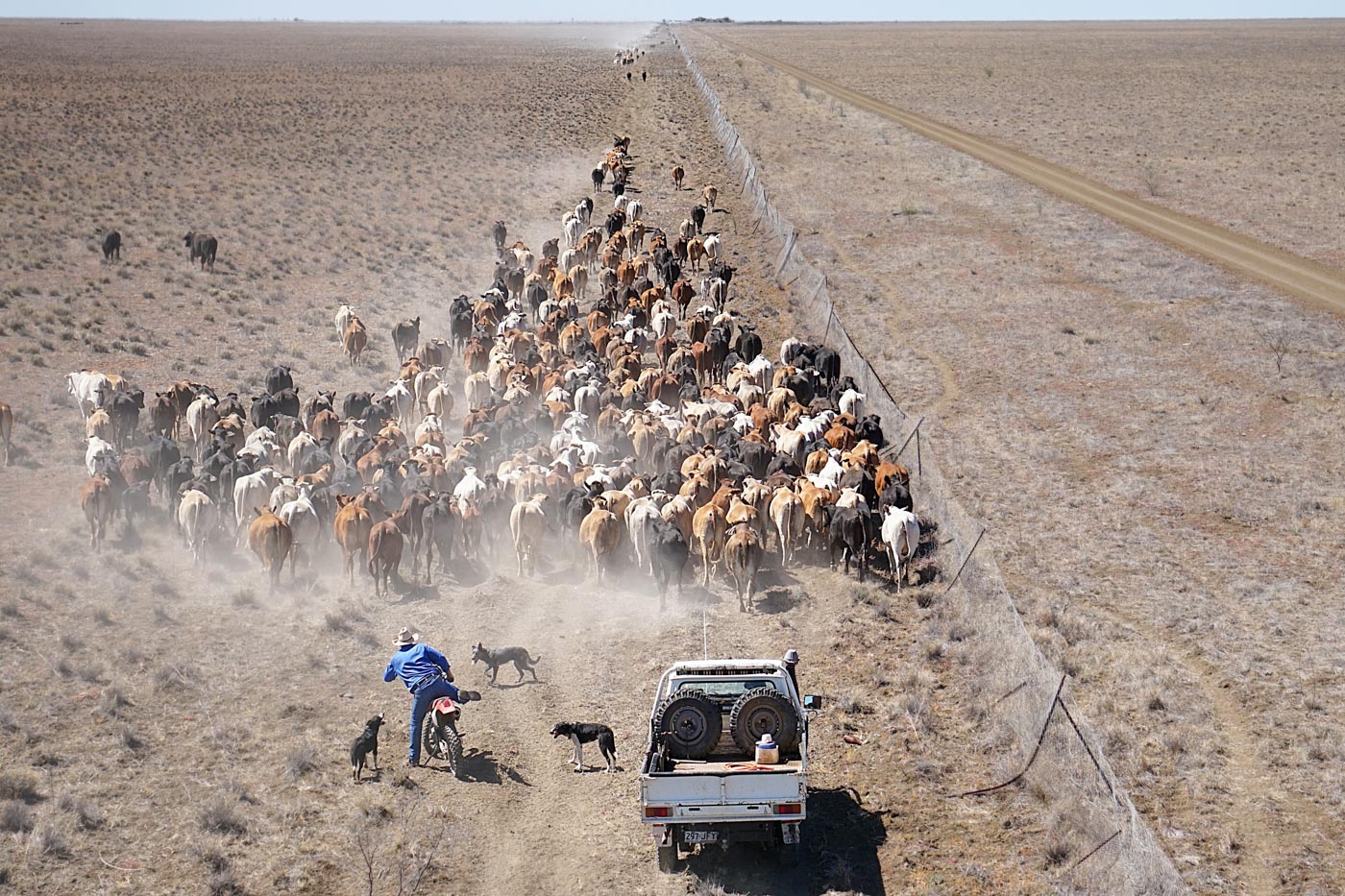
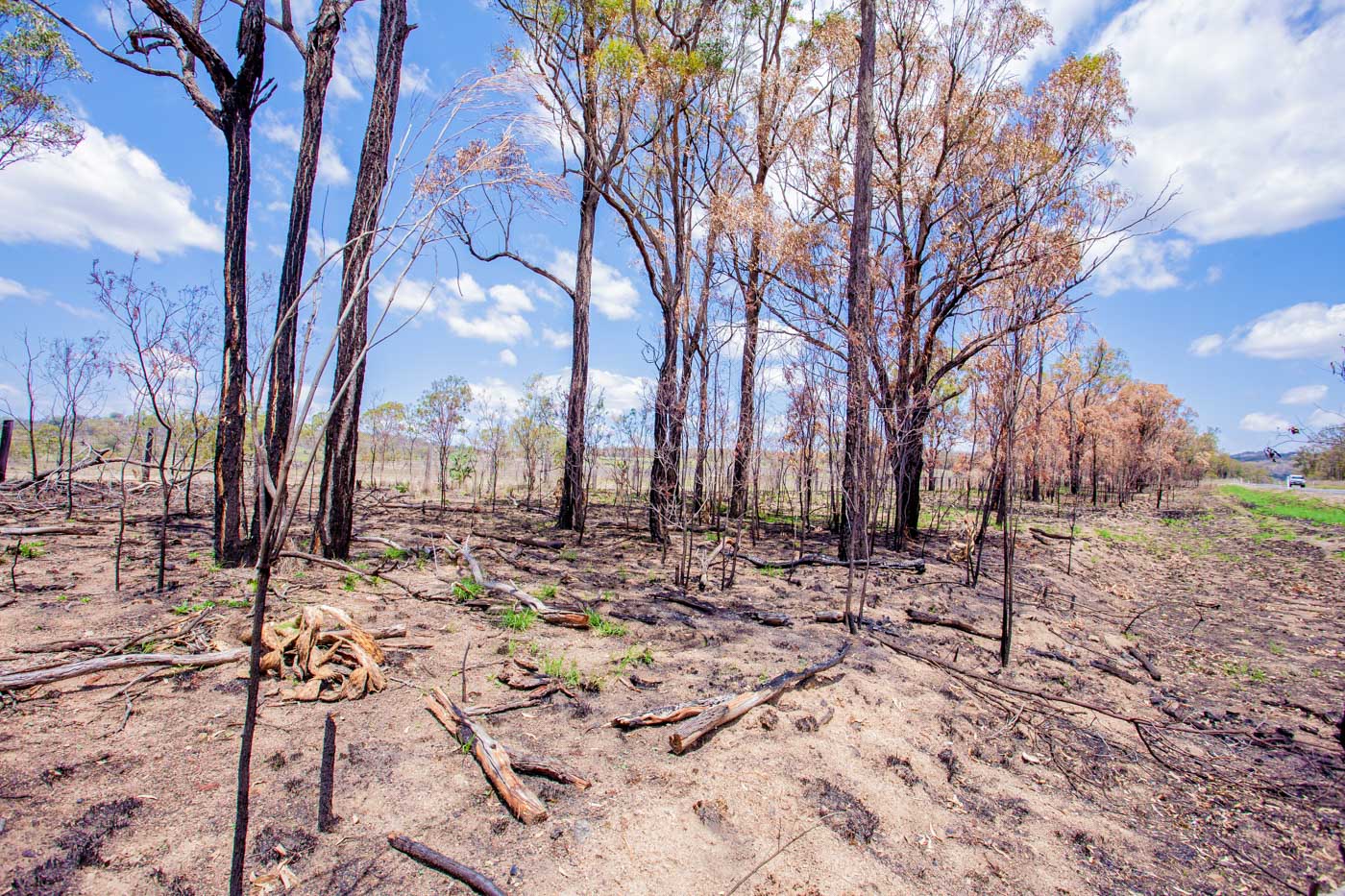
“That just ripped through my heart. It reminded me of my early twenties when my parents almost lost everything,” Johnston remembers, whose parents had owned a farm in Leyburn and felt the strain of soaring interest rates. “The pressures of farming and banking and what that can do to a family, it’s not very nice.”
Johnston was inspired to raise awareness about the drought and hosted a fundraiser at the café where she worked. Along with her co-worker, Nicki Blackwell, they raised $4,000 in one evening. Six months later, Drought Angels was born.
“I thought I’d be doing it for three to six months, the rains would come, and the drought would break,” she says. “But here we are six years later still in a terrible drought. A lot of farmers sadly since have committed suicide, but we believe we certainly have stopped some as well.”
The suicide rate for rural farmers is twice that of the general population, and a majority are men for whom a tough-it-out mentality is common. Asking for help isn’t something to which they’re accustomed.
There’s an unforgiving cycle to drought. No water leads to no grass, which leads to no feed for the livestock, which feed off the environment. Farmers will then supplement their livestock with hay, wheat and molasses to keep them going, but eventually that lack of grass creates a lack of hay, and a lack of money to replenish it.
Initially, Drought Angels provided just stock feed and groceries for farmers having trouble. Johnston cites one family she encountered with a daughter who was breaking out in boils because her parents couldn’t afford fruits and vegetables.
“I just could not believe that in our country, people couldn’t put food on the table,” she says.
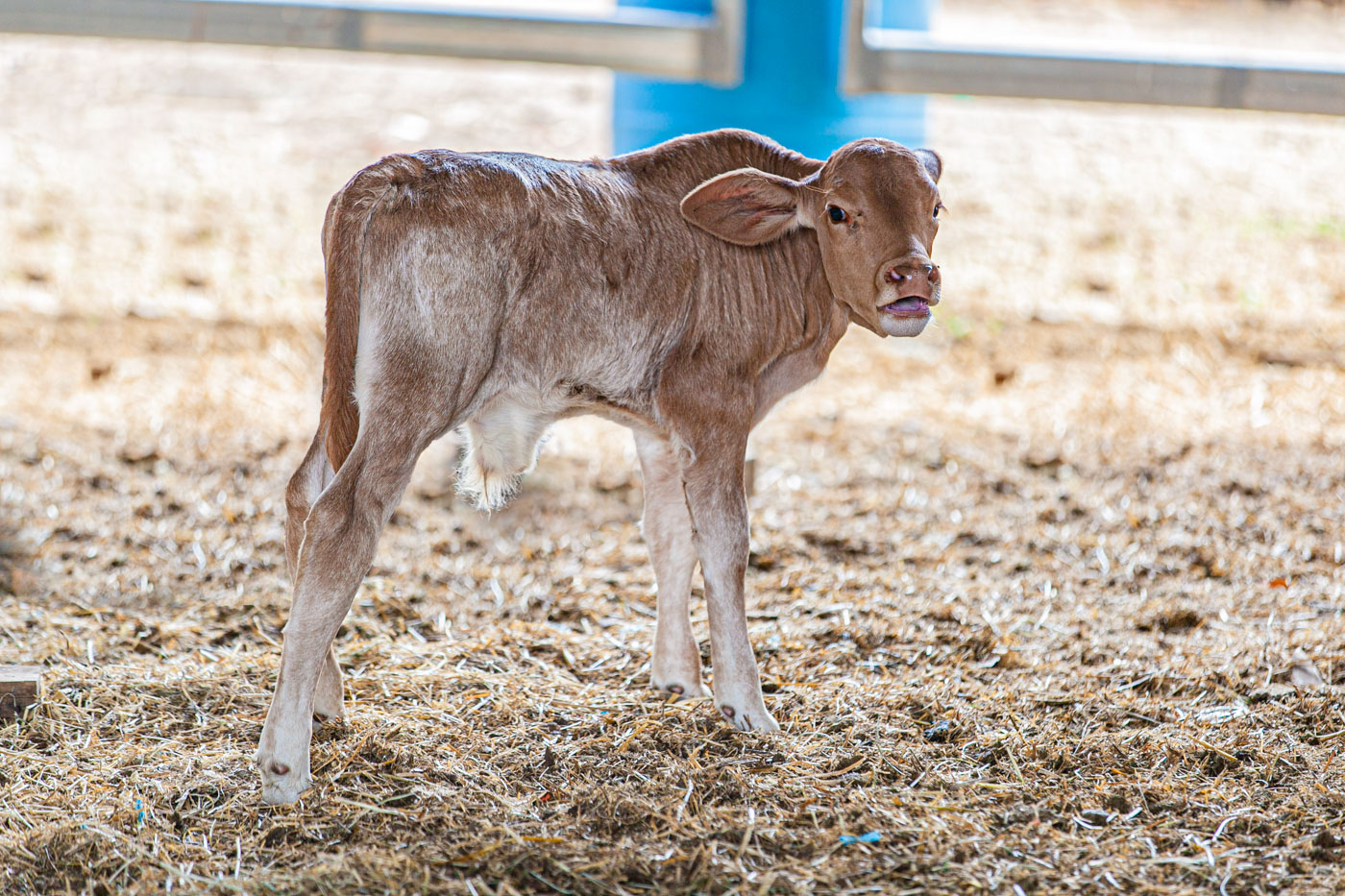
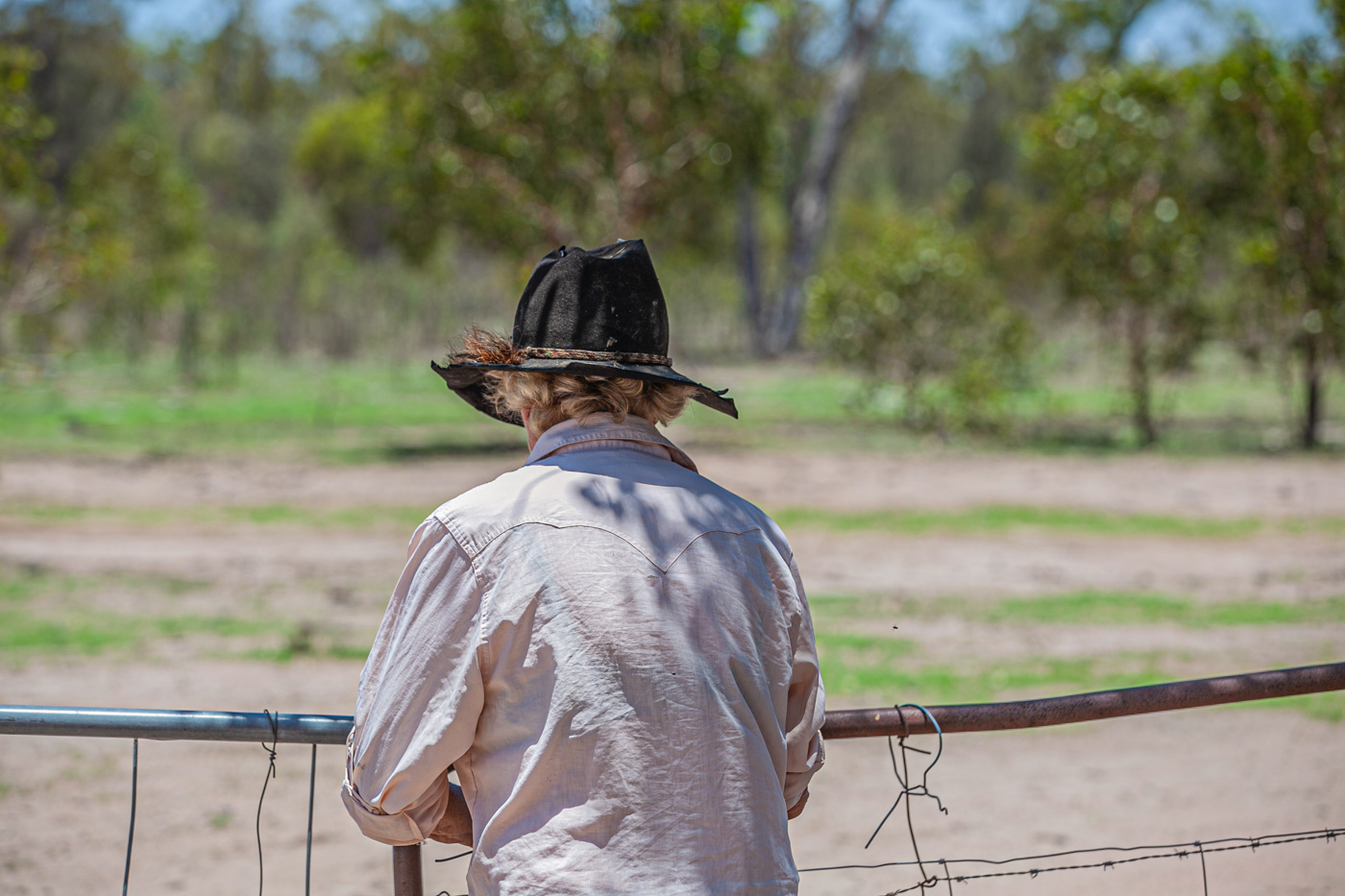
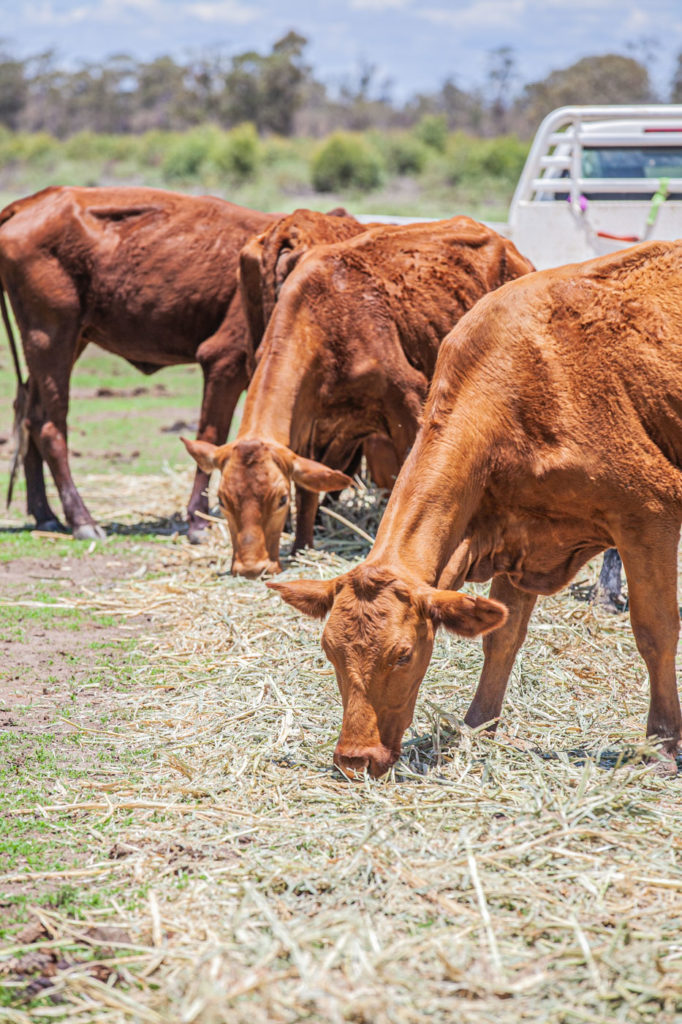
Today, support comes in the form of a Visa gift card. Farmers can register on the Drought Angels website, where every application is given a thorough review to confirm that someone is a primary producer (of cattle, sheep, stock, orchards or other crops) to find out when their food bins have emptied and whether they have money or fuel to get to town.
“Here in Australia, there are big gaps between towns,” Johnston explains. “So [a farmer] could have to drive three, four or five hours to the nearest town to do their grocery shopping or see a doctor.”
The economics are simple: when a farmer isn’t making money, it’s not just the individual but an entire family, their children, and a community that will suffer. Without an income, a farmer will be forced to lay off their staff, people who live in a town and support its small businesses. Those small businesses also need an income to do the same.
“They’ll end up losing their staff, closing their shop, and the little towns will die out,” explains Jenny Gailey, director of Drought Angels. “We don’t want that to happen because [these towns] are so unique and incredibly resilient. We don’t want to see that lost.”
Johnston adds, “By giving [farmers] financial assistance to go into town and pay their local stock feed supplier or their local butcher, they can pay that bill with their head held high. A lot of them stop going into town because they are too embarrassed to walk down the street knowing they owe people money but have nothing to pay them with.”
In August 2018, the state of New South Wales (where Sydney is the capital) was declared one hundred percent in drought, the first time an entire state was given that designation. This brought a whirlwind of media attention and public support for drought relief. In 2019, Drought Angels saw a growth of two thousand percent, going from four part-time workers to a staff of twenty-one, plus fifty to one hundred volunteers and over $11 million dollars in aid. Currently, they look after over five thousand farmers.
Then, the 2019 to 2020 fire season began. While every state and territory has been affected, it’s the country’s eastern and southern coasts that have experienced the largest fires.
One farmer from Western Downs Queensland, who wishes to remain anonymous, shares her experience via letter:
Unrelenting drought is so overwhelmingly tough on our body, our minds, our finances, and our spirit. We thought we had the formula for dry time survival all worked out, but then it got worse. 2019 yielded only 150 millimeters [5.9 inches] of rain falling across our farm in late autumn, giving us false hope that the year might improve. Then it stopped again. No more rain fell for the rest of the year, and there was not a blade of grass left in sight by winter.
For the first time ever, we saw some of our cows give birth and then walk away, leaving their beautiful little calves behind either for us to collect or nature to deal with. These were the cows’ own survival tactics that we had never experienced over any previous years of drought. Each day, the seemingly never-ending battle was real, just to find enough hay and grain to keep our cows standing.
All stock feed was in a state of serious short supply, and even the produce stores were rationing stock feed so they could keep as many clients as happy as possible, selling them “something” to take home rather than sending them home empty-handed. Every purchase at the grocery store was measured in bales of hay. We would turn away as we internally calculated, “We could feed five cows for a whole week on the price of those shoes.”
Every moment of every exhausting, sweaty, dust-filled day was taken up with feeding and devising various ways of caring for our livestock in a micro-managed way. And praying for rain.
Everything that costs money has been put on hold for seven years to ensure we get through it by the skin of our teeth to keep the nucleolus of our breeding herd standing. All manner of repairs have been put on hold. Our tractors and trucks are all in desperate need of expensive attention. Our fifteen-year-old car was no longer safe for a long-distance drive, yet we needed to travel 420 kilometers round trip, often weekly, to attend regular specialist medical appointments.
It was at that point that our best friend, our loved one, our life-long visitor and helper on the farm was consumed by the black dog of depression and committed suicide. We crumbled. We were holding on by less than a gossamer thread when the Drought Angels appeared. They came with real help and understanding. Timely and practical assistance. The kind of help that farmers need when their backs are against the wall.
Those Angels came with Visa gift cards that could be used for any purpose that we deemed to be most important. They filled our car with bottled water, dog food, Christmas hampers, and a multitude of other wonderful things to enjoy at Christmastime and to share around with other farmers in the same plight. They didn’t stop there. A phone call from Drought Angels revealed we had been chosen along with four others to receive the use of a brand new Nissan Navara Ute for a year—hand-delivered and complete with a full tank of fuel. Real, practical help.
I can say with all honesty that without the timely help from Drought Angels, we, our farm animals, as well as many of the local wildlife would not be standing today.
“With the fires in December, I just couldn’t not do something,” says Melbourne-born chef Curtis Stone. His Beverly Hills restaurant, Maude, was already planning on South Australia for the next focus of its regional tasting menu; it changes each quarter to create new parallels between a wine region and its food. Earlier in September, Stone traveled to Australia with his executive chef Chris Flint and head sommelier Andrey Tolmachyov to research inspiration for the upcoming menu. It’s an area he says is ripe with indigenous ingredients being used in innovative ways—something he was excited to show off and encourage diners to think differently about.
“We were always planning to go live with the [South Australia] menu in January,” he continues, explaining that the commitment to spotlight the region only intensified as the bushfires burned. “Whenever something that devasting happens, the thing that hurts the most, in many ways, is the lack of tourism. People watch that and then stop going. It has a really negative effect, so we wanted to support and talk about it.”


Through March, Maude is donating one hundred percent of the profits from its South Australia menu to Drought Angels, which Stone selected as this year’s #Commit2One partner. The campaign’s focus is meant to go deeper than a one-off donation, concentrating on a specific organization for a measurable, specific impact over a twelve-month period.
“Anybody can get into an argument over a particular weather event, like a fire, and what it’s caused by. It’s much harder to get into an argument about the fact that an area has been in a drought for such a prolonged period of time,” Stone says, about his team’s decision to partner with Drought Angels. When reviewing the organizations helping in the aftermath of the fires, it was Drought Angels that checked a majority of the boxes—the farmer and producer angle being a key one.


He continues, “It’s a giant country, Australia, but one that’s not super habitable because of its climate. When you’ve got people that produce food for the country, farmers and ranchers, literally going out of business and walking off their farms [with] farmer suicides at crazy levels—the food world has to pay more attention.”
Both Gailey and Johnston are adamant that what they do through Drought Angels isn’t a “hand out” but a “thank you” to those who are essential to the country’s well-being. Australia’s weather reigns as some of the most intractable on the planet. Its farmers step into that willingly, building their lives there for the sake of everyone else’s plate.
“We’ve always said we’re the charity run by big hearts,” Johnston notes. “Our farmers mean the world to us. We’ll do whatever we can to keep them where they belong, and that’s on their farm.”
To learn more and support Drought Angels work, you can visit www.droughtangels.org.au.






Our comments section is for members only.
Join today to gain exclusive access.